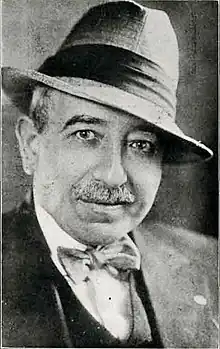Leo Feist | |
|---|---|
 Leo Feist Photo from Music Trade Review, 1922[1] | |
| Born | January 3, 1869 |
| Died | June 21, 1930 (aged 61) |
| Nationality | American |
| Occupation | Executive |
| Spouse |
Bessie Meyer (m. 1904) |
| Children | 3 |
| Relatives | Felix F. Feist (brother) Felix E. Feist (nephew) Raymond E. Feist (great-nephew) |
Leopold Feist (January 3, 1869, New York City – June 21, 1930, Mount Vernon, New York), in 1897 founded and ran a music publishing firm bearing his name. In the 1920s, at the height of the golden age of popular music, his firm was among the seven largest publishers of popular music in the world. Leo Feist, Inc., ran until 1934.[2][3][4][5] The company used the motto "You can't go wrong, with any FEIST Song."[6]
Leo Feist, Inc.
.jpg.webp)
Feist marketed his publications very aggressively, even by Tin Pan Alley standards. He maintained offices in most major cities, each with a regional manager (in Boston, for instance, his delegate was Billy Lang). Favored employees were rewarded with corporate largesse; in 1914, for instance, selected managers gathered in Atlantic City, where it was said that "money flowed like water."[7]
As evidence of the size of his firm, Leo Feist, Inc., was one of seven defendants named in a 1920 Sherman antitrust suit brought by the US Justice Department for controlling 80% of the music publishing business.[8] The 7 were Consolidated Music Corporation, Irving Berlin, Inc., Leo Feist, Inc., T.B. Harms & Francis, Day & Hunter, Inc., Shapiro, Bernstein & Co., Inc., Waterson, Berlin & Snyder, Inc., and M. Witmark & Sons, Inc.[9]
"My Blue Heaven," written by Walter Donaldson (music) in collaboration with George Whiting (lyrics), became the biggest song in the history of Leo Feist, Inc. Gene Austin recorded it (Victor 20964), selling over five million copies, and Eddie Cantor plugged it in vaudeville and in the Ziegfeld Follies of 1927. It sold over five million copies of sheet music.[4]
In 1935, five years after the death of Leo Feist, Metro-Goldwyn-Mayer acquired a controlling interest in the capital stock of Leo Feist, Inc.[10] In 1973, MGM sold Robbins, Feist, and Miller (known as Big 3) to United Artists.[11] In 1981, MGM acquired UA and formed MGM/UA Communications Co.[12] In 1983, MGM/UA sold its music publishing business to CBS Records.[13] CBS then sold the print music arm, Big 3 Music, to Columbia Pictures.[14]
Personal life
Leopold Feist was the brother of Felix F. Feist (Jul 15, 1883 – Apr 15, 1936), a sales executive at Metro-Goldwyn-Mayer. His nephew was Felix Ellison Feist (Feb 28, 1910 – Sep 2, 1965), a film and television director. His great-nephew was fantasy author Raymond E. Feist.
In a pseudo-secret ceremony, Feist married Bessie Meyer on June 24, 1904.[15] They had three children: Leonard S. Feist (1911–1996), Nathan Feist (1905–1965), and Milton Feist (1907–1975).
Leonard was a music publisher, copyright expert, and advocate for the music publishing industry; Nathan was a publisher and advertising executive; and Milton was a rabbi, scholar, teacher, publisher, and translator of opera.[16]
References
- ↑ Leo Feist Celebrates 25th Business Anniversary Archived March 11, 2023, at the Wayback Machine Music Trade Review (journal), Vol. 75, No. 13, September 23, 1922, pg. 44
- ↑ "Leo Feist Dead; Music Publisher," The New York Times, June 22, 1930
- ↑ The New Grove Dictionary of American Music (Feist is in Vol. 2 of 4), H. Wiley Hitchcock & Stanley Sadie (eds.), London: Macmillan Press (1986); OCLC 13184437
- 1 2 Tin Pan Alley: An Encyclopedia of the Golden Age of American Song (new ed.), by David Alan Jasen (born 1937), New York: Routledge (2003) (biography contains portrait); OCLC 51631299
- ↑ Biographical Dictionary of American Music, by Charles Eugene Claghorn (1911–2005), West Nyack, New York: Parker Publishing Co. (1973); OCLC 609781
- ↑ "Pal of my cradle days : A beautiful, mother waltz ballad".
- ↑ New York Clipper, August 8, 1914, p. 5 (with photo)
- ↑ "Music Publishers Sued Here As Trust," The New York Times, August 4, 1920
- ↑ Jasen, David A. (1988). Tin Pan Alley: the Composers, the Songs, the Performers, and their Times. New York: Donald I. Fine, Inc. p. 35. ISBN 1556110995.
- ↑ "Metro Acquires Leo Feist, Inc.," The New York Times, October 29, 1935
- ↑ "Big 3 Sold to UA; Plus 1/2 Can. Co". Billboard Magazine. October 27, 1973. p. 3. Archived from the original on March 7, 2023. Retrieved September 1, 2019.
- ↑ International Directory of Company Histories, Volume 25. Detroit: St. James Press. 1999. ISBN 9781558623675. Archived from the original on February 13, 2022. Retrieved February 13, 2015.
- ↑ Irv Lichtman (January 8, 1983). "CBS Songs Grows With MGM/UA Deal". Billboard. Archived from the original on March 11, 2023. Retrieved September 1, 2019 – via Google Books.
- ↑ Irv Lichtman (February 12, 1983). "Columbia Pictures To Acquire Big 3". Billboard. Archived from the original on March 11, 2023. Retrieved January 2, 2022 – via Google Books.
- ↑ "Band and Friends Greet Bridal Pair," Archived April 15, 2015, at the Wayback Machine, Evening World (Evening Edition), August 29, 1904, pg. 5
- ↑ "Leo Feist, Music Publishing King, is Dead at Sixty". Jewish Telegraphic Agency. June 24, 1930. Archived from the original on October 27, 2019. Retrieved October 27, 2019.
External links
| Archives at | ||||
|---|---|---|---|---|
|
||||
| How to use archival material |